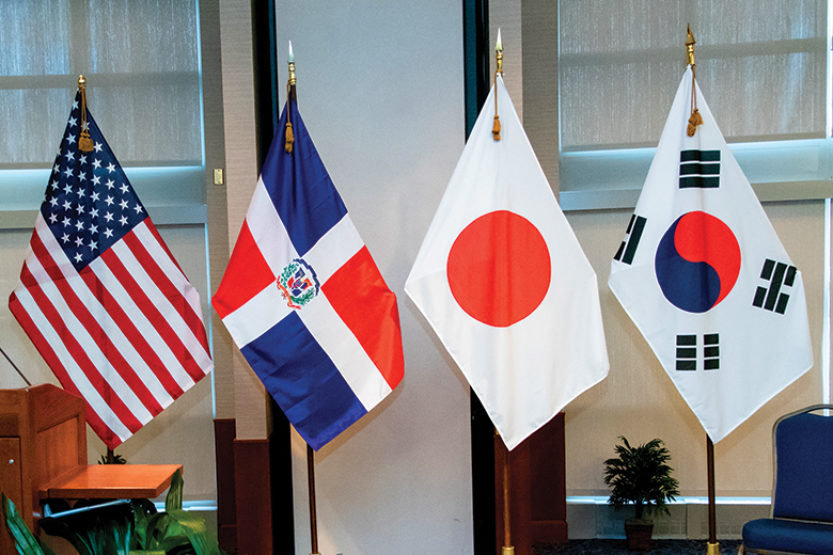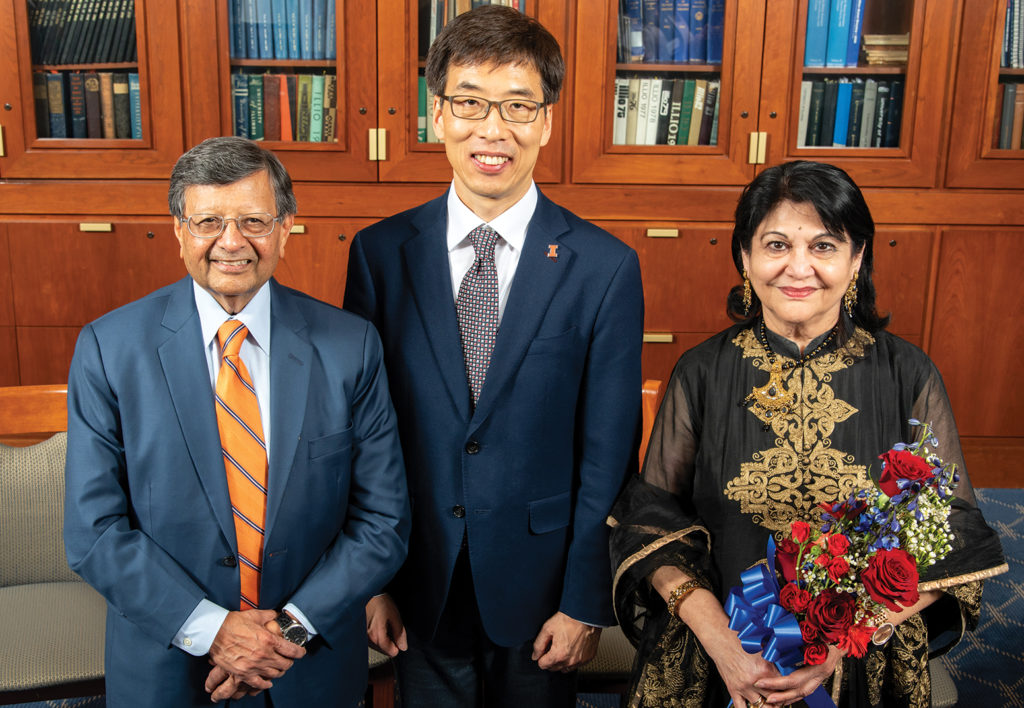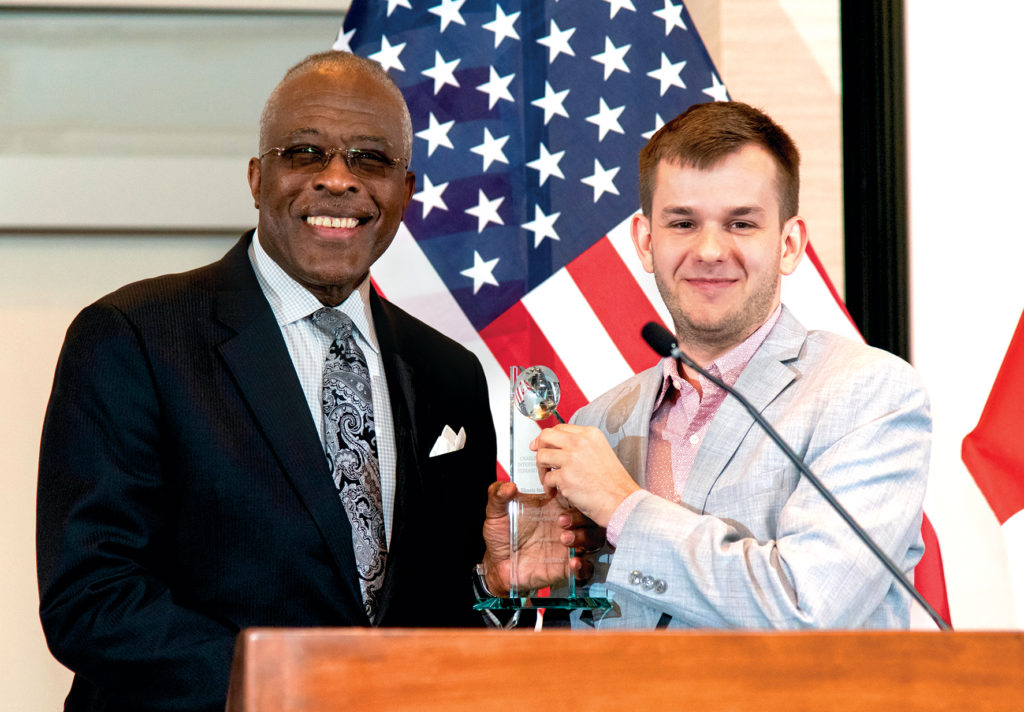International alumni awards
 (Image courtesy of UI Vice Provost Office)
(Image courtesy of UI Vice Provost Office) Established in 2001, the Madhuri and Jagdish N. Sheth International Alumni Award for Exceptional Achievement recognizes the work of distinguished international graduates who have helped to better their own nation or the world through their contributions to science, art or human welfare.
In the 25 years since he received his doctoral degree in chemistry from the University of Illinois, Jinwoo Cheon, PHD ’93 LAS, has attained superstar status in the international scientific community for his work in nanotechnology (analyzing and controlling matter at the atomic and molecular scale). He is hailed as a pioneer of nanomedicine, a rapidly burgeoning field in which nanomaterials are integrated into different types of biomedical imaging and research platforms. Research conducted by Cheon and his team has led to new, potentially revolutionary methods for the detection and treatment of cancer, heart disease and other serious ailments. As one of Cheon’s colleagues puts it, “Quite simply, Professor Cheon has brought about paradigm shifts, not only in nanoparticle design, but also in the interface between nanochemistry and medicine.”

World-renowned nanoscientist Jinwoo Cheon (center) is the recipient of the 2017/18 Madhuri and Jagdish N. Sheth International Alumni Award for Exceptional Achievement. He is joined by Dr. Sheth and his wife Madhuri, who established the award in 2001. (Image Courtesy of UI Vice Provost Office)
Cheon has led research examining ways to control the growth and shape of inorganic nanocrystals, allowing those particles to be tailored to specific uses. He and his team have gone on to develop magnetic nanoparticles that deliberately target and attach to cancer cells, where they serve as chemical triggers of cell death and growth reduction. Carried out remotely and noninvasively, without side effects or toxic residue, this “magnetic nanoswitch,” as Cheon calls the technology, holds great potential, not only for treating cancer, but in cell biology and regenerative medicine.
As one of the world’s most highly cited scientists, Cheon has seen his work referenced in more than 10,000 scientific papers. He serves as the founding director of the Center for Nanomedicine of the Institute for Basic Science, Yonsei University, Seoul, South Korea, where he holds the title of H.G. Underwood Professor.
With a humble, affable demeanor that belies his fame, brilliance and hectic schedule, Cheon recalls his trepidation when he arrived at the Illinois campus for the first time in 1988. “Coming to the United States was my first trip,” the scientist says. “I’d never been out of Korea, not even to Japan or to China … I didn’t know what to expect.” What he encountered was an academic world of expanded boundaries and exciting possibilities. “I learned a lot,” Cheon observes. “Not just science, but how to engage with a new culture and environment. I learned about interdisciplinary research, about chemistry—and also that you have to keep an open mind and have a positive attitude.”
Thirty years later, he likens his trip back to campus to receive the Sheth Award to “returning from a long journey … like coming back home.”
Improving water quality
Established in 2005, the Charles C. Stewart International Young Humanitarian Award is presented in recognition of the contributions and accomplishments of an Illinois graduate whose work has improved the welfare of communities outside the U.S.
As a junior at Illinois, Adam Brakhane, ’14 ENG, found his niche: a new engineering course that offered students the opportunity to participate in a water project in the nation of Honduras. The course, which covered monitoring, budgeting and managing water distribution in low-resource rural areas, offered Brakhane the opportunity to combine his interest in humanitarianism with his passion for science.

Chancellor Robert J. Jones presents Adam Brakhane with the 2017/18 Charles C. Stewart International Young Humanitarian Award. (Image courtesy of UI Vice Provost Office)
“I was never that great of a student,” says Brakhane, with a modesty that masks his accomplishments. “But I loved projects and was able to effectively organize myself and others. Because of that, I tended to take engineering classes geared more toward building something. I did pretty well there.”
While Brakhane had previously traveled to Honduras during high school on a medical brigade trip, he had never visited the country as an engineer. The class took him to Las Queseras, a small village in southwestern Honduras that was plagued by poor water quality due to an outdated and underfunded water monitoring program, which Brakhane describes as “expensive, dangerous and often unreliable.” He returned to campus with Las Queseras very much on his mind, and the following year, he enrolled in a class devoted to innovation and engineering design.
Throughout the semester, Brakhane developed plans for a system of data recorders that could efficiently monitor and manage water resources in Las Queseras and other low-resource communities—including a prototype metering system that he built in his apartment and tested in his bathtub. With those plans formalized, Brakhane applied for an award from the Leung Student Venture Fund (a resource that allows electrical engineering students at Illinois to complete projects beyond normal classroom activities), and received the finances needed to begin implementing his designs. Not long after graduation, Brakhane went back to Honduras, where he spent four months installing recorders, collecting data and collaborating with local water-resource workers.
Brakhane continues to volunteer in Honduras, serving as a mentor to other Illinois engineering students in the Honduras Water Project class. In 2017, he helped found Akelos, a water-resource nonprofit that consults with other non-governmental entities on engineering, administration, networking and community health issues. He currently serves as director of software engineering at Tovala, a food-technology startup based in Chicago.
“The driver for all my work, humanitarian and otherwise, is that I want it to be impactful,” Brakhane says. “When you show up and do a good job, it can really affect a lot of people.”


